In this guide, LitLearn students (and 2022 IB grads!) Lareina Shen and Saesha Grover share their wisdom on how to conquer the IB English Higher Level Essay (HLE).
Lareina achieved an IB44, and Saesha achieved an IB45 as well as the coveted IB7 in IB English Literature HL, so you are in safe hands.
Meet your instructor Jackson Huang, Founder of LitLearn. His mission is to make IB English as pain-free as possible with fun, practical lessons. Jackson scored an IB45 and was accepted to Harvard, Amherst, Williams Colleges, and full scholarships to University of Melbourne & Queensland.

What is IB English HLE?
The HL Essay (HLE) is a 1200-1500 word essay about a text studied in the IB English course. For Lang Lit, the work you choose to analyze can be literary or non-literary, but for IB English Literature the text must be literary.
The HLE will make up 25% of your final IB English HL grade, and it is graded externally. You must choose your own line of inquiry (i.e. a question that you will answer in your HLE–more on this later).
How do I choose my text for HLE?
Do NOT choose the “easiest” text. Life is always better when you do things you're interested in, and that advice applies to the HLE, too. Choose the literary / non-literary work that interests you the most, so that you can (semi?)-enjoy the HLE planning and writing process.
You could start by thinking of a theme that you find particularly interesting and determining which text studied in class demonstrates this theme well.
How do I choose my line of inquiry for HLE?
The line of inquiry is the core question that you will answer in your essay. A quick example might be:
"To what extent is masculinity undermined by the characterisation of Little Thomas?"
Now, it's your job to forge your destiny and come up with your own line of inquiry. But it's not a complete free-for all! There are rules. The main rule is that your line of inquiry must fall under one of the 7 main concepts of IB English (see below for a quick summary).
| Concept | Suggestions for your line of inquiry |
| Identity | How is the identity of a particular character or group of characters represented? OR, how does the text relate to the identity of the writer? |
| Culture | How is the culture of a particular setting, institution, or community represented? OR, how does the text relate to a particular culture/cultural perspective? |
| Creativity | How does the text represent a collective or individual creativity/lack of creativity? OR, how does the text reflect the writer's creativity? |
| Communication | How are acts of communication/failures in communication conveyed? OR, how does the text represent an act of communication? |
| Transformation | How is transformation represented? OR, how is the text transformative to other texts through reference to them, or to the reader in terms of transforming their beliefs and values? |
| Perspective | How is a certain perspective conveyed? OR, how does the text represent the writer's perspective? |
| Representation | How are different themes, attitudes, and concepts represented? OR, in what way is reality / the world represented? |
This summary is vague, so let's go in-depth on a couple of these concepts to really show you what you should be doing in the HLE.
Deep Dive
Identity
Identity is what makes you, YOU. Here are some questions the concern your own personal identity:
- What is your favourite colour? And why is it your favourite?
- What makes you different from others? Why do you think these qualities came to be?
- How would someone describe you in three words?
Now apply this same logic to characters within your text.
- How would you describe this character in three words?
- How do their actions within a text influence your view of their identity?
- How has the author crafted this character to make you view the character in a certain way?
Let's take a look at a concrete example of how we might choose evidence and quotes for a HLE on cultural identity. This example is based on a Vietnamese work in translation “Ru” by author Kim Thúy. For context, “Ru” is an autobiographical fictional account which explores Kim Thúy's move from Vietnam to Canada as an immigrant and her consequent struggles. The structure of her novel is largely lyrical and poetic.
Let's look at a section from her novel that may help us come up with an essay idea based on the concept of Identity. When she returns to Vietnam, she attends a restaurant, however this becomes a major awakening for her in terms of how she views her own personal identity. Kim narrates within her novel:
The first time I carried a briefcase, the first time I went to a restaurant school for young adults in Hanoi, wearing heels and a straight skirt, the waiter for my table didn't understand why I was speaking Vietnamese with him.
Page 77, Rú
This is a perfect quote for the Identity concept. Can you see why? Let's think through it together…
Why would the waiter be confused if Kim, a “briefcase”-carrying individual in “heels” and a “straight skirt”, was speaking Vietnamese with him?
What does being “Vietnamese” look like to the waiter? Why does Kim not conform to his expectation? Was it perhaps due to what she was wearing?
Now, if we look at the section which follows this in the novel, we are able to see the impact this had on
the character of Kim's sense of identity.
the young waiter reminded me that I couldn't have everything, that I no longer had the right to declare I was Vietnamese because I no longer had their fragility, their uncertainty, their fears. And he was right to remind me.
Page 77, Rú
Here, we can clearly see that this character is now questioning her Vietnamese cultural identity. This is just one example that demonstrates the concept of Identity.
Culture
Culture seems to be this confusing thing. Does it have to do with religion? Race? Beliefs? What does it mean? Does the monster from Frankenstein fit into a certain culture?
The easiest way to put it is this: Culture is the way someone lives. It is their “way of life.” Think of it as an umbrella term. “Culture” can include so many different things; the list just goes on, for example religion, values, customs, beliefs, cuisine, etc.
Now think, how would I form an essay from this concept?
- When you read a text in class, you will notice that authors let you form an opinion on the culture of certain characters or groups within a text, but how is this done?
- How does the author represent the culture of a certain community?
- What types of patterns in daily routines are discussed?
Creativity
It seems odd writing an essay about “creativity” because… like… how can anyone definitively say what ‘counts' as being creative–or not? When I say the word creativity, I think of new inventions, or maybe those weird and wacky art installations living inside those ‘modern art' museums. But hey, what's creative to me might not be creative to you!
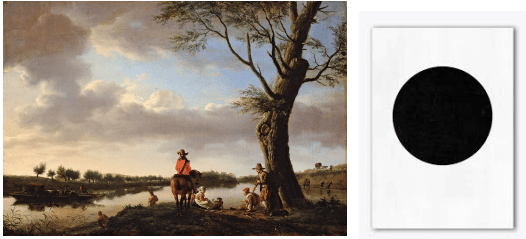
When formulating a HLE on the concept of creativity we have two main pointers for you. Look for:
- Interesting + Unique techniques or literary devices used within a text by the author. You can learn more in the Learn Analysis section of LitLearn.
- Recurring stylistic choices by the author
Now, for this concept, let's look at how we might select supportive evidence and quotations for a HLE oncreativity within the narrative style of author Mary Shelley in “Frankenstein”. The narrative style uses epistolary narration. This is a narrative technique in which a story is told through letters. This was something that I found both interesting and recurring within Frankenstein, which I believe worked to create a personal touch within the novel.
Additionally, Mary Shelley allows different characters to narrate Frankenstein during different volumes. Let's investigate this! I have written out different character profiles of the narrators below:
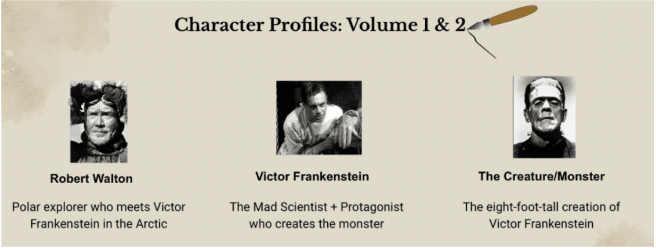
These 3 characters, each relate a part of the novel Frankenstein. This is an example of a creative authorial choice that allows us, as readers to explore different points of view within the text. This is just one example of a creative aspect of a text which you can analyze for your HLE.
Representation
Representation is all about how something is portrayed, conveyed, shown, described, illustrated, depicted. There are many different things that can be ‘represented' within a text, and it doesn't have to be tangible.
For instance, you can look at how a belief, idea or attitude is depicted within a text through different characters or devices.
Again, let's explore a concrete example to make things clear: this time the graphic novel “Persepolis”. We'll consider an HLE on how a text represents the impact of political turmoil on society.
Chapter 10 of “Persepolis” highlights societal changes occurring due to the Iranian Revolution. The panels below list the authorial choices relevant to the negative representation of political change in a society. When looking at the techniques highlighted in the slides below, think about how you feel when you look at the panels below. Can you sense a more positive or negative feeling?
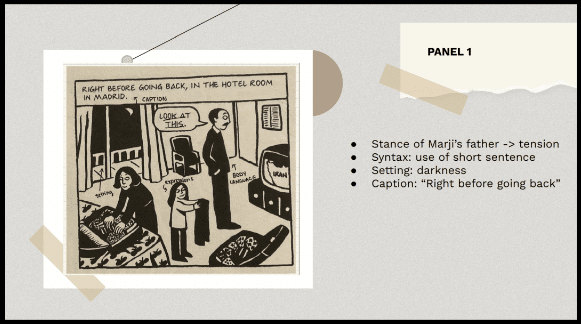
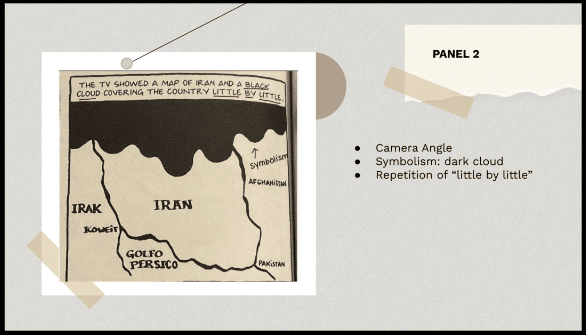
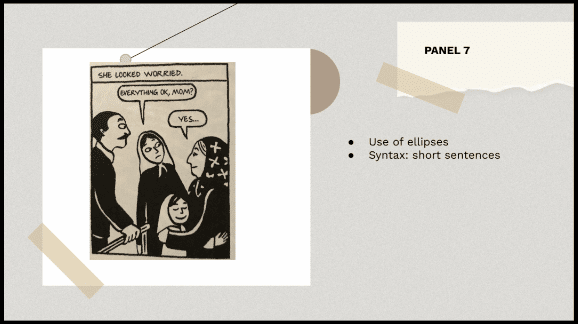
Cool, but what do we do to turn all this into an actual HL essay? Here is a sample response. The introduction might begin like this:
In the captivating graphic novel “Persepolis,” the author Marjane Satrapi explores the social and political impacts of the Iranian revolution. In particular, Satrapi conveys a disapproving viewpoint on political turmoil within the text. Throughout the graphic novel, Satrapi carefully represents how social isolation, hypocrisy and confusion is experienced by a young girl living in Tehran, as a result of political turmoil.
Example HLE Introduction
Then, in a body paragraph, on one of the key ideas mentioned above, we could analyze the different literary techniques. For example, Panel 1 is a great representation of the experience of confusion in the midst of political turmoil:
Marji is the younger girl pictured in the panels above. While her parents appear quite concerned by the news on the TV, she appears to not be in full comprehension of the cause for their distress. This is demonstrated by the visual imagery and dialogue, in panel 7, for instance, if you observe the facial expressions by each of the characters.
Example of analysis in body paragraph
This is just a short example from one particular text. To help you unpack any text, try look for the following when analyzing chapter to chapter:
- What is the main idea of the chapter?
- Why did the author write it? What purpose does it serve?
- What do you believe is the overarching importance of the passage?
Brainstorming Tips
If you're having trouble picking your text and line of inquiry, then use this simple 20-minute process to brainstorm potential questions for your HLE:
- For each text / non-literary work, go through each concept in the table below.
- Write down a question for each of the two prompts for each category.
- Repeat for all of your texts.
- Pick the question-text combination that has the greatest potential for strong analysis.
How do I ensure my HLE question has a good scope?
Choosing a question with good scope is extremely important, and it's one of the biggest challenges in the HLE. Here's why:
- If your scope is too broad, you may have too much to write about in order to answer the question, and therefore you won't be able to write deep analysis (which is super important–more on this later…)
- If your scope is too narrow, you may not have enough to write about and end upoveranalyzing unnecessary and obscure details. Also something to avoid!
So, to help you get the balance just right, here are three examples of HLE questions, specifically for the concept of Identity which we mentioned in the table above (by the way, the example is a made-up novel for illustration purposes).
- Too broad: “How does Irene Majov in her novel Deadly Men effectively make her narrator a powerful mouthpiece?”
- Too narrow: “How does Irene Majov in her novel Deadly Men effectively make her narrator a powerful mouthpiece for the concerns of Asian-Americans toward discrimination in the workforce in the 21st century?”
- Just right: “How does Irene Majov in her novel Deadly Men effectively make her narrator a powerful mouthpiece for the concerns of Asian-Americans in the 21st century?”
How to get a 7 on IB English HLE
There are many things that contribute to a 7 in your HLE and your IB English grade overall. But if we had to boil it down to one secret, one essential fact… then it'd have to be this: Get really good at analysis.
Analysis is the key to a 7 in IB English. It doesn't matter if it's Paper 1, Paper 2, HLE, IO… You must learn how to analyze quotes at a deep level, and structure your analysis in a way that flows and delights your teachers and examiners.
Start with the basics
Start with the basic foundations of analysis for free inside LitLearn's Learn Analysis course.
Our free and Pro resources have helped IB English students skyrocket their grade in weeks, days and even overnight... Learn Analysis for IB English, the simplest guide to a 7 in IB English.
Basic Analysis
No sign up or credit card required.
Basic Analysis
No sign up or credit card required.
Basic Analysis
No sign up or credit card required.
Basic Analysis
Free signup required.
Basic Analysis
Free signup required.
Basic Analysis
Pro members only
Level up to Advanced Analysis
Since you're in HL, you'll also be needing Advanced Analysis skills if you want to impress your examiner. We've got all of that covered inside our Pro lessons.
Finding Quotes
Also, you'll need to find good quotes for your text. Some good sources where you can find relevant quotes include Goodreads, SparkNotes, LitCharts, and Cliffnotes. Of course, you could just find quotes yourself directly–this will ensure your quotes are unique.
Understanding the IB English HLE rubric
An essential step to getting a high mark on the HL Essay is understanding the rubric! It is SO important that you know what IB English examiners are looking for when grading your essay, as this helps you to shape the content of your essay to match (or even exceed) their expectations.
The IB English HL Essay is graded out of 20 marks. There are 4 criteria, each worth 5 marks.
Use the checklist below to make sure you're not making simple mistakes! Note that this is not the official marking criteria, and I strongly recommend that you reading the official rubric provided by your teacher.
Criterion A: Knowledge, understanding, and interpretation
- Accurate summary of text in introduction
- Focused and informative thesis statement
- Effective and relevant quotes
- Relevant and effective summary and ending statement in conclusion
Criterion B: Analysis and evaluation
- Relevant analysis of a variety of stylistic features
- Relevant analysis of tone and/or atmosphere
- Relevant analysis of broader authorial choices i.e. characterization, point of view, syntax, irony, etc.
Criterion C: Focus, organization, and development
- Introduction, body paragraphs, conclusion
- Organized body paragraphs – topic sentence, evidence, concluding statement/link to question
- Appropriate progression of ideas and arguments in which evidence (i.e. quotes) are effectively implemented
Criterion D: Language
- Use expansions (e.g. “do not”) instead of contractions (e.g. “don't”)
- Use of a variety of connecting phrases e.g. “furthermore”, “nonetheless”, “however”, etc.
- Complete sentence structures and subject-verb agreement
- Correct usage of punctuation
- Appropriate register – no slang
- Historic present tense: the use of present tense when recounting past events. For example, we want to write “In The Hunger Games, Peeta and Katniss work together to win as a district” instead of using the word “worked”.
- Avoid flowery/dictionary language just to sound smart; it is distracting and difficult to read. As long as you concisely communicate your message using appropriate language, you will score a high mark under this criterion.
Summary
Here's everything we discussed:
- IB English HLE is tough work! Start early.
- Brainstorm using the table of concepts to come up with a strong HLE question. Don't give up on this!
- Analysis is the key to a 7 in IB English HLE (and in fact all IB English assessment). Check out LitLearn's course Learn Analysis for IB English for immediate help on the exact steps to improve in IB English analysis.
Good luck, and may the odds be ever in your favor 💪


